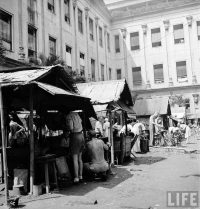The people who had homes, servants, friends, and business associates on the outside were fortunate indeed!
We were able to contact Catalino, and he brought us cooking utensils, charcoal, native stove, food, and other essentials. But there were many people in this prison camp who had nothing. They had been picked up by the Japanese on the street with no warning about bringing food and other necessities.
There were many others who were transients and seamen from various parts of the world. The ships which would have carried them to their destinations were bombed and destroyed in Manila Harbor, and passengers and crew escaped with only the clothes on their backs.
These people had no outside contacts from whom to obtain food and clothing, they had little or no money and those with traveler’s checks were reluctant to cash them for a shakedown discount.
I tried to cash a traveler’s check today and learned that I would lose exactly thirty percent. Already a few of our fellow internees—the opportunists, Shylocks, and leeches—were in operation!
Interned Red Cross officials were working on the Japanese to get food, utensils, and kitchen equipment. These interned Red Cross officials, with the co-operation of outside people, stepped in to help these destitute people with food, clothing, and bedding. They also tried to bring in field kitchens, but our benevolent jailers refused.
We already had a Central Committee, a self-governing body of Americans and Englishmen elected by us and approved by the Japanese.
These conscientious and hard-working men had daily contacts with the Nips. It was through their efforts, farsightedness, and courage that the camp was able to obtain food, hospital supplies, and equipment. It was through their patience, tact, and constant nagging that our handy men were able to install additional toilets, showers, sinks and stoves.
Other committees, such as discipline, work, morality, education, and recreation, were formed.
Buildings and grounds were thoroughly policed, and small particles of paper and refuse were picked up from the grass. Not so much as a tiny piece of paper was permitted to remain, for the Commandant, a strict disciplinarian, ordered that if so much as a cigarette butt was found on the grounds or in the buildings, our privileges would be taken away from us. If trash was thrown out of the windows, the windows would be sealed. The mere thought of closed windows in this intense heat had us leaning backwards to keep everything spotless. If anyone threw a scrap of paper on the grass, there were half a dozen self-appointed guards to pounce on the offender.
A monitor was appointed for each room. His job was to see that the room was kept clean and to appoint occupants of the room for various duties, such as guarding the room and keeping the toilets clean.
Our room monitor was Rainbow, a charming southern woman with an abundance of tact and an even disposition. She would need it for the rough days ahead, for with over fifty women and children of various ages, nationalities, races, and backgrounds and temperaments, jammed together in one room, it spelled dynamite.
Catesy and Henry were assigned to garbage detail. They went about their work in high humor, as though they enjoyed their task thoroughly.
Their detail started at eight every morning. The large wooden cart holding the garbage resembled a sedan chair, minus the gilt, and the liveried sedan bearers. There was no lovely lady peeping coyly through silken curtains. Only mountains of garbage and two grinning and perspiring men who went from floor to floor to collect the refuse.
I watched for them every morning, and the moment they saw me they broke into the characteristic dog-trot of a rickshaw coolie as they whined in a high and discordant sing-song.
The hospital already had forty patients, and we gave cholera, typhoid, and dysentery shots to over thirty-seven hundred people in the clinic.
Today, a young American girl with typhoid was hustled out of camp to ar outside hospital. Her case was passed on to a German doctor appointed by the Nips. When he approved her case, she was immediately sent outside.
We had doctors from the Rockefeller Medical Center in Peiping and missionary doctors from China and remote provinces of the Philippines. We had our own local civilian doctors and Red Cross Filipino doctors from the outside. The nursing staff consisted of American, British, Burmese and Filipino nurses.
Zenia, the nurse from India, and my old friend Brinny, the British nurse, worked on the same shift with me.
The Burmese and Filipino nurses came in daily from the outside, and their cheerful presence helped us forget our worries. How faithfully they tried to keep us posted on news from the outside world!
Before passing on any information, they’d ask in a conspiratorial manner, “Where can we talk?”
Their news was always good, and we wondered sometimes why we were in the clink when our forces were so victorious.
The Red Cross set up a kitchen for mothers and children where coffee, milk, fruit juice, and cereal were served. A second kitchen was completed to serve old men and women and those who were destitute or with no local contacts.
With close to five hundred children running around more or less wild and unsupervised, it was imperative to start schools functioning from kindergarten through high school.
Classes were in daily session in empty rooms and on the fourth floor of the Big House, and, of course, all the teachers were internees.
Today, as I left the hospital, I saw a dancing class in session. What next? With jaws slack, I stood gawking at the young terpsichorean hopefuls trying to imitate the graceful movements of their teacher.
A dwarfed figure, complete with rifle and sloppy uniform, stepped up beside me.
This was my exit cue!
